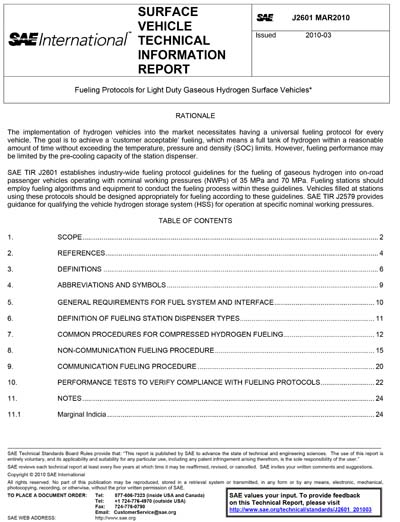Historical
SAE J 2601-2010 (SAE J2601-2010)
Fueling Protocols for Light Duty Gaseous Hydrogen Surface Vehicles
SAE TIR J2601 establishes safety limits and performance requirements for gaseous hydrogen fuel dispensers. The criteria include maximum fuel temperature at the dispenser nozzle, the maximum fuel flow rate, the maximum rate of pressure increase and other performance criteria based on the cooling capability of the station's dispenser. This document establishes fueling guidelines for 'non-communication fueling' in the absence of vehicle communication and guidelines for 'communication fueling' when specified information is transmitted from the vehicle and verified at the dispenser. The process by which fueling is optimized using vehicle-transmitted information is specified. This document provides details of the communication data transmission protocol. This document applies to light duty vehicle fueling for vehicles with storage capacity from 1 to 10 kg for 70 MPa and 1 to 7.5 kg for 35 MPa. It is intended to be revised in the next two years to include separate requirements for fueling heavy duty vehicles and motorcycles, forklifts and also for residential hydrogen fueling appliances. Since there is a significant difference between the onboard storage capacity of heavy-duty and light-duty vehicles, the performance specifications could be different. This document applies to fueling using an average pressure ramp rate methodology which is to be verified with a hydrogen dispenser test apparatus as defined CSA HGV 4.3. This document includes provisions for optional alternative communications fueling protocols and is planned to be revised in the future to include specifications for additional fueling processes to allow more freedom than the present document. New dispenser protocol proposals would need to be verified with data and experience demonstrating the fueling algorithm's capability to operate within the constraints of Section 5. It is expected that this document will be used in conjunction with the CSA HGV 4.3 Hydrogen Dispenser Temperature Compensation Confirmation Report, which will to provide a test method and equipment specification for confirming that the performance of a fuel dispenser is consistent with the requirements of SAE TIR J2601. This document establishes a formal industry-wide fueling guideline that supersedes all temporary guidelines informally established by non-ANSI-certified organizations, such as the vehicle manufacturer (OEM) document Fueling Specification for 70 MPa Compressed Hydrogen Vehicles, Version A posted on the NextEnergy website and all CaFCP Fueling Protocols. It is understood, however, that other fueling protocols that differ from the look-up table-based protocol specified in this document may be used when the station provider has (a) an agreement from a vehicle manufacturer that the protocol is appropriate for a particular vehicle system, and (b) a method of identifying the particular vehicle and limiting the protocol to that vehicle is utilized in the station design and operation. The intent is that developments be brought to the SAE TIR J2601 team to enable modification of the document to allow for a more performance based approach for future revisions. The current document is table-based, providing concise performance targets and dispenser performance specifications for both communicated and non communicated fills as shown in Figure 2 and detailed in Sections 5 through 9.
Content Provider
Society of Automotive Engineers [sae]






